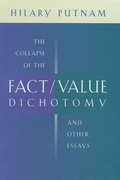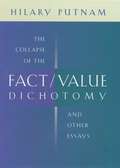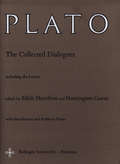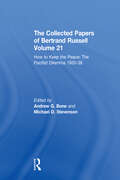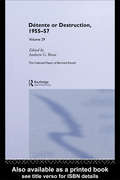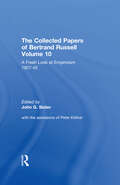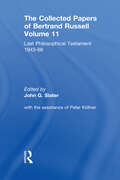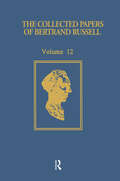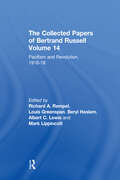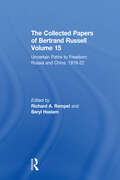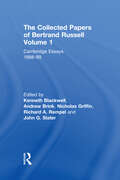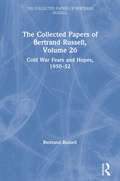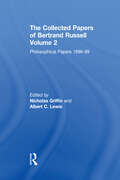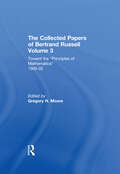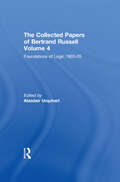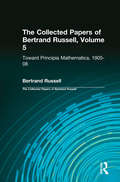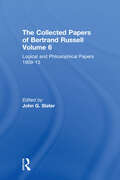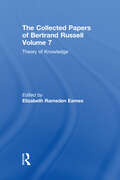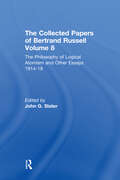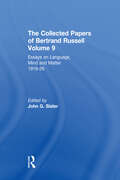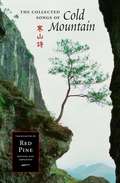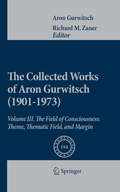- Table View
- List View
The Collapse of the Fact/Value Dichotomy and Other Essays
by Hilary PutnamIf philosophy has any business in the world, it is the clarification of our thinking and the clearing away of ideas that cloud the mind. In this book, one of the world's preeminent philosophers takes issue with an idea that has found an all-too-prominent place in popular culture and philosophical thought: the idea that while factual claims can be rationally established or refuted, claims about value are wholly subjective, not capable of being rationally argued for or against. Although it is on occasion important and useful to distinguish between factual claims and value judgments, the distinction becomes, Hilary Putnam argues, positively harmful when identified with a dichotomy between the objective and the purely "subjective." Putnam explores the arguments that led so much of the analytic philosophy of language, metaphysics, and epistemology to become openly hostile to the idea that talk of value and human flourishing can be right or wrong, rational or irrational; and by which, following philosophy, social sciences such as economics have fallen victim to the bankrupt metaphysics of Logical Positivism. Tracing the problem back to Hume's conception of a "matter of fact" as well as to Kant's distinction between "analytic" and "synthetic" judgments, Putnam identifies a path forward in the work of Amartya Sen. Lively, concise, and wise, his book prepares the way for a renewed mutual fruition of philosophy and the social sciences.
The Collapse of the Fact/Value Dichotomy: and Other Essays Including the Rosenthal Lectures
by Hilary PutnamPutnam explores the arguments that led so much of the analytic philosophy of language, metaphysics, and epistemology to become openly hostile to the idea that talk of value and human flourishing can be right or wrong, rational or irrational; and by which, following philosophy, social sciences such as economics have fallen victim to the bankrupt metaphysics of Logical Positivism.
The Collected Dialogues of Plato
by Plato Edith Hamilton Huntington Cairns Lane CooperAll the writings of Plato generally considered to be authentic are here presented in the only complete one-volume Plato available in English. The editors set out to choose the contents of this collected edition from the work of the best British and American translators of the last 100 years, ranging from Jowett (1871) to scholars of the present day. The volume contains prefatory notes to each dialogue, by Edith Hamilton; an introductory essay on Plato's philosophy and writings, by Huntington Cairns; and a comprehensive index which seeks, by means of cross references, to assist the reader with the philosophical vocabulary of the different translators.
The Collected Letters of Alan Watts
by Anne Watts Alan Watts Joan WattsPhilosopher, author, and lecturer Alan Watts (1915–1973) popularized Zen Buddhism and other Eastern philosophies for the counterculture of the 1960s. Today, new generations are finding his writings and lectures online, while faithful followers worldwide continue to be enlightened by his teachings. The Collected Letters of Alan Watts reveals the remarkable arc of Watts’s colorful and controversial life, from his school days in England to his priesthood in the Anglican Church as chaplain of Northwestern University to his alternative lifestyle and experimentation with LSD in the heyday of the late sixties. His engaging letters cover a vast range of subject matter, with recipients ranging from High Church clergy to high priests of psychedelics, government officials, publishers, critics, family, and fans. They include C. G. Jung, Henry Miller, Gary Snyder, Aldous Huxley, Reinhold Niebuhr, Timothy Leary, Joseph Campbell, and James Hillman. Watts’s letters were curated by two of his daughters, Joan Watts and Anne Watts, who have added rich, behind-the-scenes biographical commentary. Edited by Joan Watts & Anne Watts
The Collected Letters of Alan Watts
by Alan WattsPhilosopher, author, and lecturer Alan Watts (1915–1973) popularized Zen Buddhism and other Eastern philosophies for the counterculture of the 1960s. Today, new generations are finding his writings and lectures online, while faithful followers worldwide continue to be enlightened by his teachings. The Collected Letters of Alan Watts reveals the remarkable arc of Watts&’s colorful and controversial life, from his school days in England to his priesthood in the Anglican Church as chaplain of Northwestern University to his alternative lifestyle and experimentation with LSD in the heyday of the late sixties. His engaging letters cover a vast range of subject matter, with recipients ranging from High Church clergy to high priests of psychedelics, government officials, publishers, critics, family, and fans. They include C. G. Jung, Henry Miller, Gary Snyder, Aldous Huxley, Reinhold Niebuhr, Timothy Leary, Joseph Campbell, and James Hillman. Watts&’s letters were curated by two of his daughters, Joan Watts and Anne Watts, who have added rich, behind-the-scenes biographical commentary. Edited by Joan Watts & Anne Watts
The Collected Papers of Bertrand Russell Volume 21: How to Keep the Peace: The Pacifist Dilemma, 1935-38 (The Collected Papers of Bertrand Russell)
by Bertrand RussellIn Collected Papers 21 Bertrand Russell grapples with the dilemma that confronted all opponents of militarism and war in the 1930s—namely, what was the most politically and morally appropriate response to international aggression. How to Keep the Peace contains some of Russell’s best-known essays, such as the famous Auto-obituary and his treatment of The Superior Virtue of the Oppressed. Like the sixteen previous volumes in Routledge’s critical edition of Russell’s shorter writings, however, Collected Papers 21 also includes a number of unpublished manuscripts from the Bertrand Russell Archives at McMaster University. Moreover, it recovers for Russell scholars and general readers alike a rich vein of material that has previously appeared in print only in obscure or long-defunct newspaper and periodical publications.
The Collected Papers of Bertrand Russell Volume 29: Détente or Destruction, 1955-57 (The Collected Papers of Bertrand Russell)
by Bertrand RussellDétente or Destruction, 1955-57 continues publication of Routledge's multi-volume critical edition of Bertrand Russell's shorter writings. Between September 1955 and November 1957 Russell published some sixty-one articles, reviews, statements, contributions to books and letters to editors, over fifty of which are contained in this volume. The texts, several of them hitherto unpublished, reveal the deepening of Russell's commitment to the anti-nuclear struggle, upon which he embarked in the previous volume of Collected Papers (Man's Peril, 1954-55). Continuing with the theme of nuclear peril, this volume contains discussion of nuclear weapons, world peace, prospects for disarmament and British-Soviet friendship against the backdrop of the Cold War. One of the key papers in this volume is Russell's message to the inaugural conference of the Pugwash movement, which Russell was instrumental in launching and which became an influential, independent forum of East-West scientific cooperation and counsel on issues as an internationally agreed nuclear test-ban.In addition to the issues of war and peace, Russell, now in his eighties, continued to take an interest in a wide variety of themes. Russell not only addresses older controversies over nationalism and empire, religious belief and American civil liberties, he also confronts head-on the new and pressing matters of armed intervention in Hungary and Suez, and of the manufacture and testing of the British hydrogen bomb. This volume includes seven interviews ranging from East-West Relations after the Geneva conference to a Meeting with Russell.
The Collected Papers of Bertrand Russell, Volume 10: A Fresh Look at Empiricism, 1927-1946 (The Collected Papers of Bertrand Russell)
by Bertrand RussellDuring the period covered by this volume, Bertrand Russell first retired from and then resumed his philosophical career. In 1927 he published two philosophy books, The Analysis of Matter and An Outline of Philosophy. His next book in academic philosophy, An Inquiry into Meaning and Truth, was not published until 1940.Yet, Russell published a significant amount of essays and popular books between 1927 and 1946, mostly to finance the running of Beacon Hill School, and his growing family. Those years also saw his break-up with Dora Russell, his marriage to Patricia (Peter) Spence and a move of the family to the United States. Volume 10 brings together Russell's writings on ethics, politics, religion and academic philsophy. It is an invaluable guide to the thought and development of one of the most famous philosophers of this century.
The Collected Papers of Bertrand Russell, Volume 11: Last Philosophical Testament 1947-68 (The Collected Papers of Bertrand Russell)
by Bertrand RussellThis volume collects together Russell's philosophical writings during the period from 1947-68. For about half of this period Russell worked steadily at philosophy but after the publication of My Philosophical Development in 1959 he retired from academic philosophy for the second time. After that date, only the occasional philosophical piece appeared, as he was preoccupied with political writings. In this volume there are a handful of papers dated later than 1959, and all of these were certainly written by Russell himself.This volume contains Russell's writings on diverse philosophical interests, including autobiographical and self-critical papers, critiques of other philosophers and his controversial opinions on Christianity.
The Collected Papers of Bertrand Russell, Volume 12: Contemplation and Action, 1902-14 (The Collected Papers of Bertrand Russell)
by Bertrand RussellContemplation and Action 1902-14 is the first volume devoted exclusively to Russell's non-technical writings. It follows chronologically Volume 1, Cambridge Essays: 1888-99 which presented his earliest papers.
The Collected Papers of Bertrand Russell, Volume 14: Pacifism and Revolution, 1916-18 (The Collected Papers of Bertrand Russell)
by Bertrand RussellDuring the First World War, Bertrand Russell was political commentator for The Tribunal, the official weekly publication of the No-Conscription Fellowship, of which Russell was Action Chairman.This volume contains many short papers from that period, which reflect Russell's immediate reponses to developments in the conflict. These documents bear witness to Russell's growing commitment to pacifism, and reveal the development of the patterns of political argument, rhetoric and activism which were to characterise his work throughout his life.
The Collected Papers of Bertrand Russell, Volume 15: Uncertain Paths to Freedom: Russia and China 1919-1922 (The Collected Papers of Bertrand Russell)
by Bertrand Russell Richard A. Rempel Andrew Bone Albert C. Lewis Beryl HaslamThe Collected Papers of Bertrand Russell, Volume 15 assembles Russell's writings on his experiences of visiting and reflecting on Russia and China.Having emerged from the Great War determined to prevent another armed conflict, Russell became a champion of international socialism as the antidote to the destructive forces of nationalism and capitalism. His quest for international reconstruction led to two enduring experiences, his trip first to Bolshevik Russia in 1920 and then to divided China in 1920-21. These letters describe those experiences which confirmed his emergence as a popular commentator on contemporary political issues.The volume includes two unpublished papers on Russell's trip to Russia.
The Collected Papers of Bertrand Russell, Volume 1: Cambridge Essays 1888-99 (The Collected Papers of Bertrand Russell #1)
by Nicholas Griffin Richard A. Rempel Andrew Brink Kenneth Blackwell John G. SlaterCovering the topics of God, immortality, conscience and immortality, this volume presents a selection of essays of the first decade of Russell as an independent thinker. It includes his graduate essays, adolescent writings and ideas on ethics, Bacon, Hobbes and DesCartes, psychology and politics.
The Collected Papers of Bertrand Russell, Volume 26: Cold War Fears and Hopes, 1950–52 (The Collected Papers of Bertrand Russell)
by Bertrand RussellThe Collected Papers of Bertrand Russell, Volume 26 covers a period of transition in Russell's political life between his orthodox and sometimes pugnacious defence of the West in the early post-war, and the dissenting advocacy of nuclear disarmament and détente that started in earnest in the mid-1950s. While some of the assembled writings echo harsh prior criticism of Soviet expansionism and dictatorship, others register growing qualms about the recklessness of American foreign policy and the baneful effects on civil liberties of anti-communist hysteria inside the United States. Whether continuing to push for western rearmament, or highlighting in a more placatory vein the folly of the Cold War's divisions and rival fanaticisms, Russell's paramount objective was avoiding a war that threatened global catastrophe. Suspended between fear and hope, he expounded his evolving political concerns–and much else besides, including autobiographical reflections and typically common-sense guidance for living well–in a constant flow of newspaper and magazine articles, letters to editors, radio broadcasts and discussions and, of special note, a Nobel Prize acceptance speech. Russell also completed two lecture tours of the United States (the last of many), as well as a landmark such visit to Australia. All three of these journeys, and the textual record they left, are examined in depth using manuscript material and unpublished correspondence from the Bertrand Russell Archives at McMaster University, which is mined extensively throughout the volume.
The Collected Papers of Bertrand Russell, Volume 2: The Philosophical Papers 1896-99 (The Collected Papers of Bertrand Russell)
by Nicholas Griffin Albert C. Lewis William G. StrattonThe 1896-1899 papers, few of which were published in Russell's lifetime, concentrate primarily on physics, arithmetic and the concept of quantity. Several views that later became well-known in his The Principles of Mathematics actually originate in his earlier work, and though incomplete,An Analysis of Mathematical Reasoning, forms a centrepiece of the volume.
The Collected Papers of Bertrand Russell, Volume 3: Toward the 'Principles of Mathematics' 1900-02 (The Collected Papers of Bertrand Russell)
by Gregory H. MooreThis volume shows Russell in transition from a neo-Kantian and neo-Hegelian philosopher to an analytic philosopher of the first rank. During this period his research centred on writing The Principles of Mathematics where he drew together previously unpublished drafts. These shed light on Russell's paradox. This material will alter previous accounts of how he discovered his paradox and the related paradox of the largest cardinal. The volume also includes a previously unpublished draft of an early attempt to solve his paradox, as well as the earliest known version of his generalised relation arithmetic. It contains three articles which have never previously been published in English.
The Collected Papers of Bertrand Russell, Volume 4: Foundations of Logic, 1903-05 (The Collected Papers of Bertrand Russell)
by Bertrand RussellThis volume covers the period from the beginning of Whitehead and Russell's work on Volume 2 of the Principles of Mathematics to the critical discovery of the theory of descriptions in 1905. The volume contains a large number of unpublished manuscripts which give a vivd picture of Russell wrestling with the logical paradoxes, often unsuccessfully, as he tries out one foundational scheme after another. Previously unpublished work in the theory of denoting is included, which predates the famous article of 1905. This volume also gathers together several manuscripts on the so-called 'zig-zag' theory with which Russell attempted to provide a type-free foundation for mathematics. A number of reviews and survey articles, together with two talks on modality and truth, are also published for the first time.
The Collected Papers of Bertrand Russell, Volume 5: Toward Principia Mathematica, 1905–08 (The Collected Papers of Bertrand Russell #5)
by Bertrand RussellThis volume of Bertrand Russell's Collected Papers finds Russell focused on writing Principia Mathematica during 1905–08. Eight previously unpublished papers shed light on his different versions of a substitutional theory of logic, with its elimination of classes and relations, during 1905-06. A recurring issue for him was whether a type hierarchy had to be part of a substitutional theory. In mid-1907 he began writing up the final version of Principia, now using a ramified theory of types, and eleven unpublished drafts from 1907-08 deal with this. Numerous letters show his thoughts on the process. The volume's 80-page introduction covers the evolution of his logic from 1896 until 1909, when volume I of Principia went to the printer.
The Collected Papers of Bertrand Russell, Volume 6: Logical and Philosophical Papers 1909-13 (The Collected Papers of Bertrand Russell)
by Bertrand Russell Bernd Frohmann John G. SlaterThe years covered by this volume of the Collected Papers of Bertrand Russell were among the most productive, philosophically speaking, of Russell's entire career. In addition to the papers reprinted here, he bought Principia Mathematica to its finished form and wrote The Problems of Philosophy, Theory of Knowledge and Knowledge of the External World. In October 1910 he began teaching at Cambridge, having accepted an appointment as lecturer in logic and the principles of mathematics at Trinity College for a term of five years. A year later Ludwig Wittgenstein began to attend his lectures. Within a few months he was influencing Russell's philosophical thinking as much as, or more than, Russell was influencing his.
The Collected Papers of Bertrand Russell, Volume 7: Theory of Knowledge: The 1913 Manuscript (The Collected Papers of Bertrand Russell)
by Bertrand Russell Kenneth Blackwell Elizabeth Ramsden EamesThis volume provides a historical introduction in the writing of the manuscript. Theory of Knowledge: The 1913 Manuscript is the only book-length work on epistemology that Russell left unpublished in its original form, and its publication here is an important addition to knowledge of Russell's thought.
The Collected Papers of Bertrand Russell, Volume 8: The Philosophy of Logical Atomism and Other Essays 1914-19 (The Collected Papers of Bertrand Russell)
by Bertrand Russell John G. SlaterThis volume collects together all of Russell's philosophical papers inspired by his work with Whitehead on 'Principia Mathematica'.
The Collected Papers of Bertrand Russell, Volume 9: Essays on Language, Mind and Matter, 1919-26 (The Collected Papers of Bertrand Russell)
by Bernd Frohmann John G. SlaterThis volume contains Russell's reviews of and introductions to other philosophical works including his famous introduction to Wittgenstein's Tractatus Logico-Philosophicus.
The Collected Philosophical Papers of G.E.M. Anscombe: Ethics, Religion And Politics
by G. E. AnscombeAn essential collection of Anscombe's work on ethics and intention <p> Gertrude Elizabeth Margaret Anscombe is considered one of analytical philosophy's most prominent figures and a leader in the field of virtue ethics. Ethics, Religion, and Politics: Collected Philosophical Papers, Volume 3, is part of a multi-volume compilation of her work surrounding the philosophy of mind, philosophy of action, philosophy of language, philosophical logic, and ethics. This volume includes selected works relating to consequentialism, intention, and more, providing Ascombe scholars with a high-level view of her evolution of thought.
The Collected Songs of Cold Mountain
by Cold MountainThis authoritative, bilingual edition represents the first time the entirety of Cold Mountain's poetry has been translated into English.These translations were originally published by Copper Canyon Press nearly twenty years ago. Now, significantly revised and expanded, the collection also includes a new preface by the translator, Red Pine, whose accompanying notes are at once scholarly, accessible, and entertaining. Also included for the first time are poems by two of Cold Mountain's colleagues.Legendary for his clarity, directness, and lack of pretension, the eight-century hermit-poet Cold Mountain (Han Shan) is a major figure in the history of Chinese literature and has been a profound influence on writers and readers worldwide. Writers such as Charles Frazier and Gary Snyder studied his poetry, and Jack Kerouac's Dharma Bums is dedicated "to Han Shan." 1.Bstoried cliffs were the fortune I castbird trails beyond human trackswhat surrounds my yardwhite clouds nesting dark rocksI've lived here quite a few yearsand always seen the spring-water changetell those people with tripods and bellsempty names are no damn good 71.someone sits in a mountain gorgecloud robe sunset tasselshandful of fragrances he'd sharethe road is long and hardregretful and doubtfulold and unaccomplishedthe crowd calls him crippledhe stands alone steadfast 205.my place is on Cold Mountainperched on a cliff beyond the circuit of afflictionimages leave no trace when they vanishI roam the whole galaxy from herelights and shadows flash across my mindnot one dharma comes before mesince I found the magic pearlI can go anywhere everywhere it's perfect Cold MountainA mountain man lives under thatchbefore his gate carts and horses are rarethe forest is quiet but partial to birdsthe streams are wide and home to fishwith his son he picks wild fruitwith his wife he hoes between rockswhat does he have at homea shelf full of nothing but books
The Collected Works of Aron Gurwitsch (1901-1973)
by Richard M. Zaner Aron GurwitschThis volume of the Collected Works edition contains Gurwitsch's magnum opus, which emphasizes how items in the thematic field are relevant to the theme. It is introduced by his student Richard Zaner. This volume also includes the posthumous text, "Marginal Consciousness," the contents of which were merely summarized in The Field of Consciousness. It presents his positions on the body and on ego-less consciousness in detail. Gurwitsch's student, Lester Embree, introduces it. For the full appreciation of their significance, all earlier and later writings by Gurwitsch must be related to the contents of this volume.
